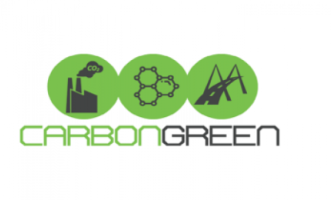CARBONGREEN aims to develop experimental processes and technology to convert CO2 of cement plants into useful solid nanocarbons (graphene, CNTs) and simultaneously to apply them to the formation of composite products with improved properties.
Cement industries are the world’s largest sources of greenhouse gas CO2 that is released during limestone dissociation. Taking into account the need to remove CO2 from the atmosphere as well as the recent achievements of nanotechnology, the
The partnership involves a research institute, NCSR D, and two large companies, the cement industry TITAN S.A. and MEGARA RESINS, a resin manufacturer. The partners are united in the common objective of the proposal, each having a complementary, distinct but important role.
The scientific objectives of the program can be summarized as follows:
(1) CO2 conversion into high-value added nanocarbons (graphene, nanotubes, nanofibers, etc.) on a laboratory scale at NCSR D through CO2 reduction processes using molten metals and / or metal salts, and
(2) optimization of nanocarbon production methods.
The technological and production objectives of the proposal are:
(1) pilot production of nanocarbons at the premises of TITAN,
(2) incorporation of the produced nanocarbons into cement products of TITAN to enhance the mechanical properties of cement mortars,
(3) incorporation of the produced nanocarbons into polymeric resins of MEGARA RESINS to enhance the mechanical properties of the resins.
The main research activity will be developed at NCSR D and concerns the design and construction of two devices based on chemical transformation of CO2 to nanocarbons with controlled morphology and properties. The first arrangement will use the metallothermic technique of alkali metals (Mg, Ca) treatment in a reducing atmosphere containing CO2 that will lead to the production of sheet-like nanocarbons in the form of graphenes. The second device will use the electrolysis of molten carbonates (e.g. Li2CO3, etc.) with low voltage (~ 2V) that will reduce CO2 dissolved in the melt to carbon nanowires and nanotubes with parallel release of O2 into the atmosphere. Continuous entry of the hot CO2 into reactor and dissolution in the molten salts will allow constant non-stop process. Nanocarbon production processes will be evaluated and the most efficient one will be developed on a pilot scale at TITAN’s facilities.
Nanocarbons produced on a laboratory scale as well as during the pilot production will be introduced into TITAN’s cement products and MEGARA RESINS’ polymeric resins. Composite materials will be tested for mechanical properties and stability. It is expected that both companies with the development of new advanced composite materials will enrich their entire range of products and increase their sales in the Greek and European markets of building and polymer materials. The new products will have the “green carbon footprint”. The ecological products and their production techniques will contribute to environmental protection.
The scientific results and achievements of the project will be widely disseminated via papers in scientific journals of great impact, participation in Greek and international conferences, trade fairs on products and technologies, presentation at a specially organized workshop with the participation of well-known scientists, launching of a website, etc.
Theoretical calculations predict that the net profit per ton of CO2 removed in the form of nanocarbons, is more than 1000 times the profit from selling the cement that produces it. This gives an unprecedentedly strong incentive to cement manufacturers and other CO2-emitting industries to develop the proposed technology. It is certain that even with less profit “the CARBONGREEN will FLOURISH”.
Co‐financed by the European Union and Greek national funds through the Operational Program Competitiveness, Entrepreneurship and Innovation, under the call RESEARCH-CREATE-INNOVATE




